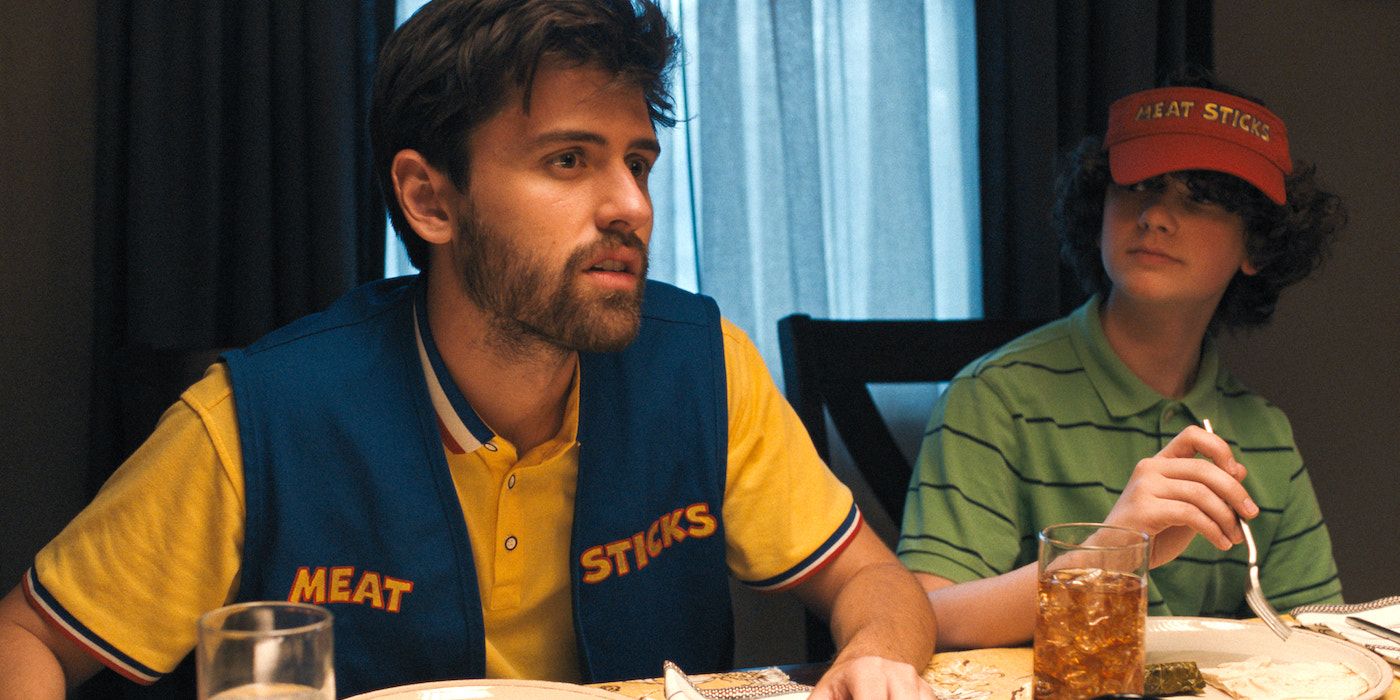Editor’s note: The below article contains spoilers for Cha Cha Real Smooth.One of the biggest hits of this year’s Sundance was Cha Cha Real Smooth, so much so that it was scooped up by AppleTV+ for a whopping $15 million. After receiving rave reviews, it will now be released in select theaters and streaming starting Friday. The second film from writer-director Cooper Raiff, who also stars, it tells a more complicated story than it initially seems on the surface. It centers on the immature Andrew who is struggling with post-college life and takes a job as a Bar Mitzvah party host even as he would rather be working at a non-profit. While trying to find his way, he forms a connection with the troubled Domino (Dakota Johnson) and her daughter Lola (Vanessa Burghardt). Andrew begins to help out with watching Lola and serves as a confidant to Domino when no one else will. His kindness is constantly on display yet we also see his flaws. He frequently becomes caught up in clinging to this new connection even when it involves him overstepping. Somehow, he also is able to consistently win people over with his awkward charm. That is until he turns into his own worst enemy as his disposition can often quickly take a darker turn that hurts others.
Whenever a filmmaker takes on a project where they control all aspects of the story, there is a question about how much of it is about positioning themselves as being a likable star. Apologies to burst your bubble, but movies can often be about the ego of those making them. When you create a vehicle for yourself to take center stage, it practically is shouting out for skepticism about its intentions. It is easy to see how there can be mixed takeaways about Cha Cha Real Smooth, as well as Raiff’s debut film Shithouse. Both are based around him playing people who are similarly endearing. It is a point his newest frequently hammers home, leaving some feeling as though it may be teetering into being self-aggrandizing. Nevertheless, what gets overlooked is just how much his charming characters can turn cruel. Often motivated by jealousy, it adds unexpected wrinkles to stories that benefit greatly from their introduction. It isn’t always able to strike the perfect balance, though it still strives for something deeper.
Towards the end of Cha Cha Real Smooth, Raiff increasingly leans into Andrew’s many faults. We had already seen how he could often say unnecessarily hurtful things to his family, including those who are just trying to support him, though it would also be intercut with his more precocious playfulness. That soon begins to fade away as he becomes caught up in his own emotional turmoil, lashing out when he doesn’t get his way. Even as Domino has a fiancé, he is often demanding of her attention even when she pushes him away. Such moments make it feel like his outward, feel-good persona was a mask for his more complicated core. As it shifts into its final act, Andrew unexpectedly and aggressively lashes out at his younger brother without provocation. He tells the kid who looks up to him most to f*ck off and threatens to beat him up, something that could be jarring if it wasn’t so believable. Andrew was always happiest when he was the center of attention and everything was going his way. As soon as that begins to fall apart before his eyes, this kind kid becomes much less so.
He often becomes confrontational when people set boundaries, failing to take no for an answer and pushing far beyond what is appropriate. This echoes what happened towards the end of Shithouse. In that film, his character proceeded to send a flurry of messages to a classmate he only just met and confronted her when she didn’t respond to them. He felt he was entitled to her complete time and attention, becoming rather scary when he didn’t get what he wanted. It doesn’t pull any punches in showing just how despicable he could be. The charisma we once saw quickly became something much more obnoxious and out of line. How much of this is done intentionally is worth discussing as both films soon offer the characters almost immediate redemption. Everything going wrong quickly resolves itself. However, all of his many flaws still remain front of mind as we see him with still a lot of room to grow. It reveals just how much he is floundering in insecurity. He projects confidence and charm so that it can provide cover for his greatest fears. Andrew especially is more of a fraud than he would ever admit. Despite his best efforts, we all see him for who he really is by its fitting end.
Underneath all the jokes the film and Raiff throw out there, the line that sticks with me the most is after Andrew goes uninvited to Domino’s house. After a brief conversation, he attempts to flee in the car when her fiancé arrives home. Apologizing and not making eye contact, he just says that, “I’m a dumb kid.” Domino’s fiancé doesn’t get angry, just saying he knows. While this is a brutal response that cuts through all of Andrew’s bravado, it doesn’t come from a retributive place as he checks in to make sure he is okay to drive before letting him go. It shows how the character is his own worst enemy who falls apart when confronted. Raiff seems to at least be willing to grapple with this, delving into the more complicated multilayered elements of his character underneath the image he puts forth. Cha Cha Real Smooth is all about him looking into a person who is doing their best, or at least what they think is their best, though frequently falling woefully short. Even in the final scene with Domino, someone who has tried to push him away multiple times, he can’t help cracking jokes that pump himself up. Andrew still clearly has a lot of learning to do, as a person, brother, son, and friend, in order to change his life trajectory. Raiff only shows us the first step on his long path to improving in all the many areas he needs to, making for a reflective coming-of-age story that hints at something deeper in how those with a friendly face can be deeply flawed.










































































